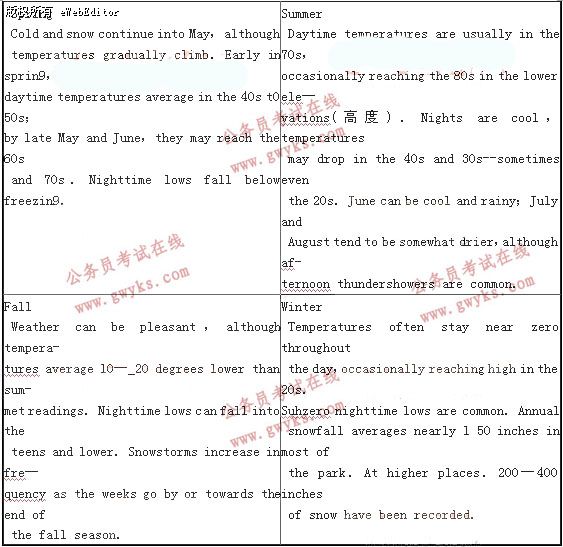A. To get ready to fight.
B. To frighten it away.
C. To protect the boy.
D. To cool down.
45. What do we know about cougars?
A. They are afraid of noises.
B. They hesitate before they hit.
C. They are bigger than we think.
D. They like to attack running people.
46. How did Jeb try to hold the cougar' s attention?
A. By keeping shouting and hitting.
B. By making a wall out of his arms.
C. By throwing himself on the cougar.
D. By swinging his fists at the cougar' s eyes.
47. Which of the following happened first?
A. The cougar jumped from the rock.
B. Tom struggled free of his father.
C. Jeb asked Tom to get the knife.
D. Jeb held Tom across his body.
D
Yellowstone Weather
Yellowstone National Park is at high altitude (海拔). Most of the park is above 7,500 feet (2,275 meters).
Yellowstone's weather is unpredictable. In summer, it may be warm and sunny with temperatures in the high 70s. At night in any given month, the temperature may drop close to freezing, So it is best to come prepared for cold evenings and mornings, especially if you are camping or hiking. When you leave your campsite, please leave it prepared for possible thundershowers and wind.
A sunny warm day may become fiercely stormy with wind, rain, sleet and sometimes snow. Without enough clothing, an easy hike or boat trip can turn into a battle for survival.
![]()

48. The author writes this passage most probably for those who plan to _________ in Yellowstone National Park.
A. do research work
B. take a business trip
C. have sports games
D. spend their holidays or take a tour
49. Which of the following best describes Yellowstone's weather?
A. Yellowstone's weather is generally changeable and it snows most of the year.
B. It's neither too hot in summer nor too cold in winter.
C. Weather in fall is pleasant and temperatures never fall below freezing.
D. It's pretty warm in the day and very cool at night throughout the year.
50. If you are planning to spend your holidays in Yellowstone National Park in summer, what should you take with you?
A. Just some light clothing such as T-shirts or skirts.
B. Just some warm clothing such as sweaters and coats.
C. Both light clothing and warm clothing.
D. Either light clothing or warm clothing.
51. What does the underlined word "readings" refer to?
A. literary works
B. books
C. announcements
D. figures
E
Louis Armstrong had two famous nicknames (綽號). Some people called him Bagamo. They said his mouth looked like a large bag. Musicians often called him Pops, as a sign of respect for his influence (影響) on the world of music.
Born in 1901 in New Orleans, he grew up poor, but lived among great musicians. Jazz had been invented in the city a few years before his birth. Armstrong often said, "jazz and I grew up together. "
Armstrong showed a great talent (天賦) for music when he was taught to play the cornet (短號) at a boy' s hone. In his late teens, Armstrong began to live the life of a musician. He played in parades, clubs, and on the steamboats that traveled on the Mississippi River. At that time, New Orleans was famous for the new music of jazz and was home to many great musicians. Armstrong learned from the older musicians and soon became respected as their equal.
In 1922 he went to Chicago. There, the tale of Louis Armstrong began. From then until the end of his life, Armstrong was celebrated and loved wherever he went. Armstrong had no equal when it came to playing the American popular song.
His cornet playing had a deep humanity (仁愛) and warmth that caused many listeners to say, "Listening to Pops. just makes you feel good all over. " He was the father of the jazz style (風格) and also one of the best-known and most admired people in the world. His death, on July 6,1971, was headline news around the world.
52. Armstrong was called Pops because he
A. looked like a musician
B. was a musician of much influence
C. showed an interest in music
D. traveled to play modern music
53. The third paragraph is developed
A. by space
B. by examples
C. by time
D. by comparison
54. Which statement about Armstrong is true?
A. His tale began in New Orleans.
B. He had been born before jazz was invented.
C. His music was popular with his listeners.
D. He learned popular music at a boy' s home.
55. Which would be the best title for the text?
A. The Invention of the Jazz Music
B. The Father of the Jazz Style
C. The Making of a Musician
D. The Spread of Popular Music
